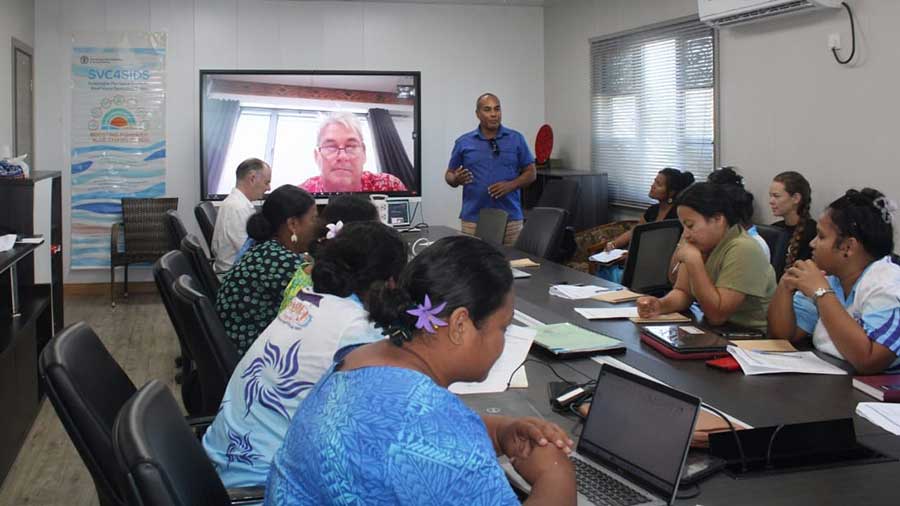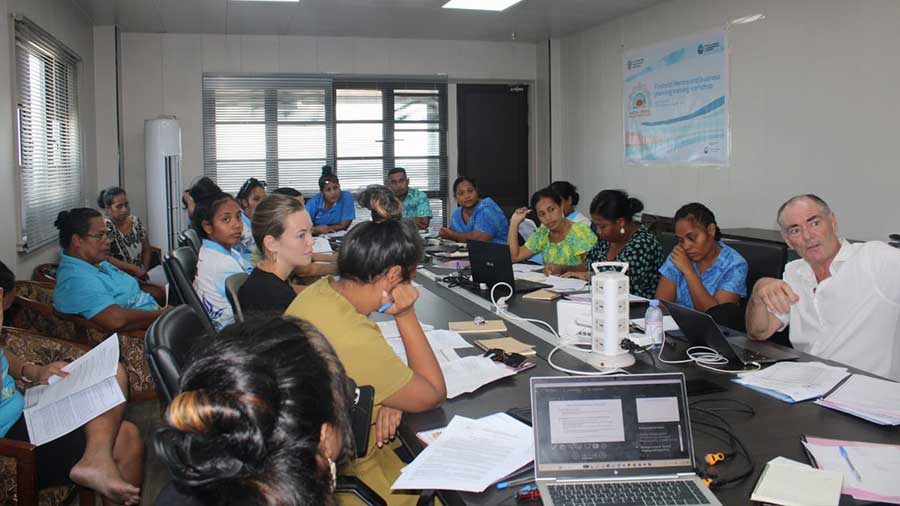Building resilient business capacities in Kiribati fishing communities

Ambo, Kiribati
In Kiribati, a comprehensive ten-year upgrading strategy was adopted in July 2023 under the FAO project Sustainable Value Chains for Small Island Developing States (SVC4SIDS). This strategy aims to enhance the domestic tuna value chain in the Gilbert Group, Kiribati, and SVC4SIDS will support its implementation until mid-2025.
As part of the upgrading strategy process, a number of activities are tailored to improve financial capacities and operational management of fishing operators. From 14 to 17 May 2024, a specialised training workshop on financial literacy and business planning was delivered to individuals, coastal communities, and micro, small, and medium enterprises (MSMEs), equipping them with essential tools to enhance their economic prospects. The training, attended by 19 participants, included a wide variety of representatives from the Ministry of Fisheries and Marine Resource Development (MFMRD) divisions, Central Pacific Producers Limited (CPPL), and faith-based organisations such as Kindling Kiribati. The workshop covered topics such as entrepreneurship, management, literacy, and numeracy, addressing the identified learning needs to support the participants’ professional development.
The main objective of the training was to provide a business model tailored for community-based fish landing site businesses. "Bartering, trade, and sale of fisheries resources play a major role in supporting community livelihoods and contributing to national economies of Small Island Developing States, especially in the Pacific Islands region," said Mr Jeffrey Paul Kinch, Pacific Fisheries and Aquaculture Officer at FAO. He highlighted the significant impact of the COVID-19 pandemic, which disrupted market access due to reduced transport routes and movement restrictions, weakening the technical capacity of many MSMEs involved in fishery export businesses.
 Mr. Karibanang Tamuera, Deputy Director of the Coastal Fisheries Division at the Ministry of Fisheries and Marine Resource Development, and Mr. Jeffrey Paul Kinch, Pacific Fisheries and Aquaculture Officer at FAO, delivering the opening remarks
Mr. Karibanang Tamuera, Deputy Director of the Coastal Fisheries Division at the Ministry of Fisheries and Marine Resource Development, and Mr. Jeffrey Paul Kinch, Pacific Fisheries and Aquaculture Officer at FAO, delivering the opening remarks
An important component of the training was guiding participants in developing practical and realistic business plans. These plans are essential for identifying potential problems before they occur, structuring the financial aspects of the business efficiently, and focusing efforts on business growth. Participants learned the importance of a business plan for seeking finance or investment from banks, business partners, the government, or development projects.
 Mr Simon Diffey (far right) conducting the training sessions
Mr Simon Diffey (far right) conducting the training sessions
The workshop concluded with positive feedback and outputs from the working groups that could be applied to their businesses. Empowering local communities, particularly women and youth, is essential for social and economic well-being through enhancing professional and business skills. SVC4SIDS is committed to fostering collaborative efforts among local communities, government agencies, the private sector, and international partners to achieve a sustainable future for the island nation.

